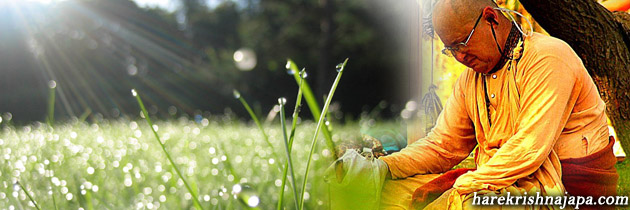15 One must chant in humility

Explanation of the “trnad api sunicena” verse of Siksastaka:
To chant the holy name always, one should be humbler than the grass in the street and devoid of all desire for personal honor, but one should offer others all respectful obeisances. A devotee engaged in chanting the holy name of the Lord should practice forbearance like that of a tree. Even if rebuked or chastised, he should not say anything to others to retaliate. For even if one cuts a tree, it never protests, nor even if it is drying up and dying does it ask anyone for water “One who thinks himself lower than the grass, who is more tolerant than a tree, and who does not expect personal honor yet is always prepared to give all respect to others, can very easily always chant the holy name of the Lord.” Raising my hands, I declare, “Everyone please hear me! String this verse on the thread of the holy name and wear it on your neck for continuous remembrance.” One must strictly follow the principles given by Lord Caitanya Mahaprabhu in this verse. If one simply follows in the footsteps of Lord Caitanya and the Gosvamis, certainly he will achieve the ultimate goal of life, the lotus feet of Sri Krsna.
This practice of forbearance (trnad api sunicena) is very difficult, but when one actually engages in chanting the Hare Krsna mantra, the quality of forbearance automatically develops. A person advanced in spiritual consciousness through the chanting of the Hare Krsna mantra need not practice to develop it separately, for a devotee develops all good qualities simply by chanting the Hare Krsna mantra regularly.
When chanting the Hare Krsna maha mantra, in the beginning one may commit many offenses, which are called namabhasa and nama aparadha. In this stage there is no possibility of achieving perfect love of Krsna by chanting the Hare Krsna maha mantra. Therefore one must chant the Hare Krsna maha mantra according to the principles of the above verse, trnad api sunicena taror iva sahisnuna. Chanting is very simple, but one must practice it seriously. Therefore the author of Caitanya−caritamrta, Krsnadasa Kaviraja Gosvami, advises everyone to keep this verse always strung about his neck.
– Sri Caitanya caritamrta Adi lila 17.26−28, 31−33
A Vaisnava is able to tolerate insults from others because he is simply interested in humbly chanting the holy name without disturbance:
[Haridasa thakura to an assembly of scholars]: “All of you may now go to your homes. May Lord Krsna bestow His blessings upon you all. Do not be sorry because of my being insulted.”
From this statement by Haridasa thakura, it is understood that a pure Vaisnava never takes anyone’s insults seriously. This is the teaching of Sri Caitanya Mahaprabhu.
trnad api sunicena taror iva sahisnuna
amanina manadena kirtaniyah sada harih
[Cc. adi 17.31]
“One should chant the holy name of the Lord in a humble state of mind, thinking oneself lower than the straw in the street. One should be more tolerant than a tree, devoid of all sense of false prestige and ready to offer all respects to others. In such a state of mind one can chant the holy name of the Lord constantly.”
A Vaisnava is always tolerant and submissive like trees and grass. He tolerates insults offered by others, for he is simply interested in chanting the holy name of the Lord without being disturbed.
– Sri Caitanya caritamrta Antya lila 3.207
Success in chanting of the holy name depends fully upon humility:
Sri Caitanya Mahaprabhu continued, “O Svarupa Damodara Gosvami and Ramananda Raya, hear from Me the symptoms of how one should chant the Hare Krsna maha mantra to awaken very easily one’s dormant love for Krsna. One who thinks himself lower than the grass, who is more tolerant than a tree, and who does not expect personal honor but is always prepared to give all respect to others, can very easily always chant the holy name of the Lord. These are the symptoms of one who chants the Hare Krsna maha mantra. Although he is very exalted, he thinks himself lower than the grass on the ground, and like a tree, he tolerates everything in two ways. When a tree is cut down, it does not protest, and even when drying up, it does not ask anyone for water. The tree delivers its fruits, flowers and whatever it possesses to anyone and everyone. It tolerates scorching heat and torrents of rain, yet it still gives shelter to others. Although a Vaisnava is the most exalted person, he is priceless and gives all respect to everyone, knowing everyone to be the resting place of Krsna. If one chants the holy name of Lord Krsna in this manner, he will certainly awaken his dormant love for Krsna’s lotus feet.”
– Sri Caitanya caritamrta Antya lila 20.20−26
One can chant Hare Krsna offenselessly by developing genuine humility:
Devahuti shows us the process for understanding transcendental subject matters. It is not by challenge but by submission. The entire bhakti process is a process of submission. That is also Caitanya Mahaprabhu’s teaching:
trnad api sunicena taror iva sahisnuna
amanina manadena kirtaniyah sada harih
[Cc. adi 17.31]
If one is interested in advancing in chanting Hare Krsna, Caitanya Mahaprabhu advises that one be humbler than the grass and more tolerant than the trees. One should not be very proud of his intelligence but should give all respect to others. In this way, one can chant Hare Krsna offenselessly.
– Teachings of Lord Kapila, the Son of Devahuti
The easiest way to control the mind is to chant Hare Krsna in all humility:
[Arjuna to Lord Krsna]: For the mind is restless, turbulent, obstinate and very strong, O Krsna, and to subdue it is, it seems to me, more difficult than controlling the wind.
The mind is so strong and obstinate that it sometimes overcomes the intelligence, although mind is supposed to be subservient to the intelligence. For a man in the practical world who has to fight so many opposing elements, it is certainly very difficult to control the mind. Artificially, one may establish a mental equilibrium toward both friend and enemy, but ultimately no worldly man can do so, for this is more difficult than controlling the raging wind. In the Vedic literatures it is said:
atmanam rathinam viddhi sariram ratham eva ca
buddhim tu sarathim viddhi manah pragraham eva ca
indriyani hayan ahur visayams tesu gocaran
atmendriya−mano−yukto bhoktety ahur manisinah
“The individual is the passenger in the car of the material body, and intelligence is the driver. Mind is the driving instrument, and the senses are the horses. The self is thus the enjoyer or sufferer in the association of the mind and senses. So it is understood by great thinkers.”
Intelligence is supposed to direct the mind, but the mind is so strong and obstinate that it often overcomes even one’s own intelligence. Such a strong mind is supposed to be controlled by the practice of yoga, but such practice is never practical for a worldly person like Arjuna. And what can we say of modern man? The simile used here is appropriate: one cannot capture the blowing wind. And it is even more difficult to capture the turbulent mind. The easiest way to control the mind, as suggested by Lord Caitanya, is chanting “Hare Krsna,” the great mantra for deliverance, in all humility. The method prescribed is sa vai manah krsna−padaravindayoh: one must enage one’s mind fully in Krsna. Only then will there remain no other engagements to agitate the mind.
– Bhagavad gita As It Is 6.34
The efficacy of the holy name depends on the quality of feeling of the chanter:
[Queen Kunti to Lord Krsna]: My Lord, Your Lordship can easily be approached, but only by those who are materially exhausted. One who is on the path of [material] progress, trying to improve himself with respectable parentage, great opulence, high education and bodily beauty, cannot approach You with sincere feeling.
Being materially advanced means taking birth in an aristocratic family and possessing great wealth, an education and attractive personal beauty. All materialistic men are mad after possessing all these material opulences, and this is known as the advancement of material civilization. But the result is that by possessing all these material assets one becomes artificially puffed up, intoxicated by such temporary possessions. Consequently, such materially puffed−up persons are incapable of uttering the holy name of the Lord by addressing Him feelingly, “O Govinda, O Krsna.” It is said in the sastras that by once uttering the holy name of the Lord, the sinner gets rid of a quantity of sins that he is unable to commit. Such is the power of uttering the holy name of the Lord. There is not the least exaggeration in this statement. Actually the Lord’s holy name has such powerful potency. But there is a quality to such utterances also. It depends on the quality of feeling. A helpless man can feelingly utter the holy name of the Lord, whereas a man who utters the same holy name in great material satisfaction cannot be so sincere. A materially puffed up person may utter the holy name of the Lord occasionally, but he is incapable of uttering the holy name in quality.
– Srimad Bhagavatam 1.8.26





